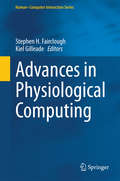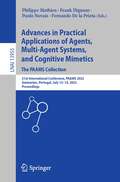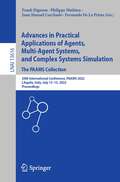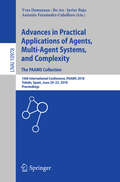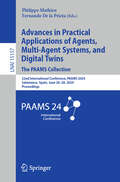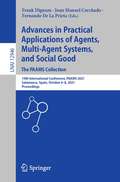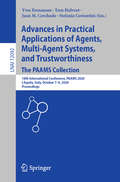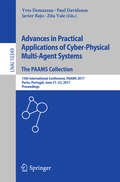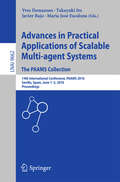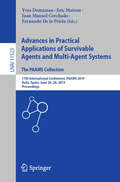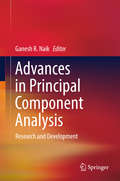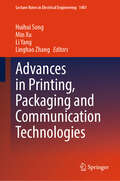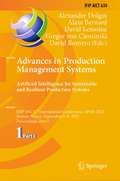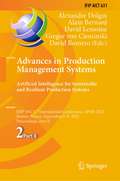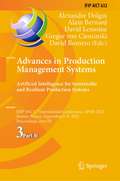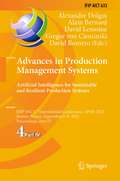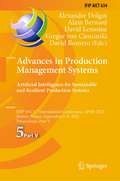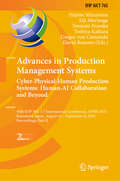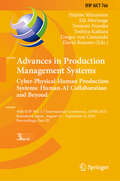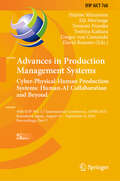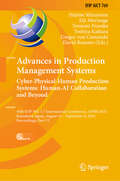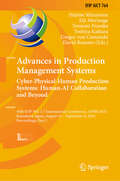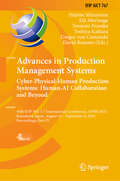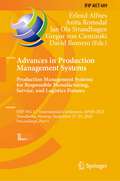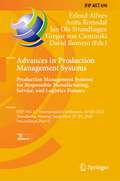- Table View
- List View
Advances in Physiological Computing (Human–Computer Interaction Series)
by Stephen H. Fairclough Kiel GilleadeThis edited collection will provide an overview of the field of physiological computing, i. e. the use of physiological signals as input for computer control. It will cover a breadth of current research, from brain-computer interfaces to telemedicine.
Advances in Practical Applications of Agents, Multi-Agent Systems, and Cognitive Mimetics. The PAAMS Collection: 21st International Conference, PAAMS 2023, Guimarães, Portugal, July 12–14, 2023, Proceedings (Lecture Notes in Computer Science #13955)
by Frank Dignum Paulo Novais Fernando De la Prieta Philippe MathieuThis book constitutes the proceedings of the 21st International Conference on Practical Applications of Agents and Multi-Agent Systems, PAAMS 2023, held in Guimaraes, Portugal, in July 2023.The 32 full papers in this book were reviewed and selected from 70 submissions. 5 demonstration papers are also included in this volume. The papers deal with the application and validation of agent-based models, methods, and technologies in a number of key applications areas, including: advanced models and learning, agent-based programming, decision-making, education and social interactions, formal and theoretic models, health and safety, mobility and the city, swarms and task allocation.
Advances in Practical Applications of Agents, Multi-Agent Systems, and Complex Systems Simulation. The PAAMS Collection: 20th International Conference, PAAMS 2022, L'Aquila, Italy, July 13–15, 2022, Proceedings (Lecture Notes in Computer Science #13616)
by Frank Dignum Juan Manuel Corchado Philippe Mathieu Fernando De La PrietaThis book constitutes the proceedings of the 20th International Conference on Practical Applications of Agents and Multi-Agent Systems, PAAMS 2022, held in L'Aquila, Italy in July 2022.The 37 full papers in this book were reviewed and selected from 67 submissions. Another 10 demonstrations papers were selected from 11 submissions are presented here as short papers. The papers deal with the application and validation of agent-based models, methods, and technologies in a number of key applications areas, including: advanced models and learning, agent-based programming, decision-making, education and social interactions, formal and theoretic models, health and safety, mobility and the city, swarms and task allocation.
Advances in Practical Applications of Agents, Multi-Agent Systems, and Complexity: 16th International Conference, PAAMS 2018, Toledo, Spain, June 20–22, 2018, Proceedings (Lecture Notes in Computer Science #10978)
by Bo An Javier Bajo Antonio Fernández-Caballero Yves DemazeauThis book constitutes the proceedings of the 16th International Conference on Practical Applications of Agents and Multi-Agent Systems, PAAMS 2018, held in Toledo, Spain, in June 2018. The 20 regular and 19 demo papers presented in this volume were carefully reviewed and selected from 57 submissions. They deal with the application and validation of agent-based models, methods, and technologies in a number of key applications areas, such as: energy and security; engineering and tools; evaluation and ethics; negotiation and organisations; personalization and learning; simulation applications; simulation platforms; social networks and humans. The book also contains two invited talks in full paper length.
Advances in Practical Applications of Agents, Multi-Agent Systems, and Digital Twins: 22nd International Conference, PAAMS 2024, Salamanca, Spain, June 26–28, 2024, Proceedings (Lecture Notes in Computer Science #15157)
by Fernando De la Prieta Philippe MathieuThis book constitutes the refereed proceedings of the 22nd International Conference on Practical Applications of Agents and Multi-Agent Systems, PAAMS 2024, held in Salamanca, Spain, during June 26-28, 2024. The 26 full papers and 6 short papers included in this book were carefully reviewed and selected from 64 submissions. The PAAMS 2024 proceedings focus on the development and deployment of agents and multi-agent systems and their real-world applications.
Advances in Practical Applications of Agents, Multi-Agent Systems, and Social Good. The PAAMS Collection: 19th International Conference, PAAMS 2021, Salamanca, Spain, October 6–8, 2021, Proceedings (Lecture Notes in Computer Science #12946)
by Frank Dignum Juan Manuel Corchado Fernando De La PrietaThis book constitutes the proceedings of the 19th International Conference on Practical Applications of Agents and Multi-Agent Systems, PAAMS 2021, held in Salamanca, Spain, in October 2021. The 27 regular and 13 short papers presented in this volume were carefully reviewed and selected from 56 submissions. They deal with the application and validation of agent-based models, methods, and technologies in a number of key applications areas, including: advanced models and learning, agent-based programming, decision-making, education and social interactions, formal and theoretic models, health and safety, mobility and the city, swarms and task allocation.
Advances in Practical Applications of Agents, Multi-Agent Systems, and Trustworthiness. The PAAMS Collection: 18th International Conference, PAAMS 2020, L'Aquila, Italy, October 7–9, 2020, Proceedings (Lecture Notes in Computer Science #12092)
by Yves Demazeau Juan M. Corchado Stefania Costantini Tom HolvoetThis book constitutes the proceedings of the 18th International Conference on Practical Applications of Agents and Multi-Agent Systems, PAAMS 2020, held in L'Aquila, Italy, in October 2020.The 29 regular and 17 demo papers presented in this volume were carefully reviewed and selected from 64 submissions. They deal with the application and validation of agent-based models, methods, and technologies in a number of key applications areas, including: advanced models and learning, agent-based programming, decision-making, educa-tion and social interactions, formal and theoretic models, health and safety, mobility and the city, swarms and task allocation.
Advances in Practical Applications of Cyber-Physical Multi-Agent Systems: The PAAMS Collection: 15th International Conference, PAAMS 2017, Porto, Portugal, (Lecture Notes in Computer Science #10349)
by Javier Bajo Yves Demazeau Zita Vale Paul DavidssonThis book constitutes the refereed proceedings of the 15th International Conference on Practical Applications of Scalable Multi-Agent Systems, PAAMS 2017, held in Porto, Portugal, in June 2017. The 11 revised full papers, 11 short papers, and 17 Demo papers were carefully reviewed and selected from 63 submissions. The papers report on the application and validation of agent-based models, methods, and technologies in a number of key application areas, including day life and real world, energy and networks, human and trust, markets and bids, models and tools, negotiation and conversation, scalability and resources.
Advances in Practical Applications of Scalable Multi-agent Systems. The PAAMS Collection: 14th International Conference, PAAMS 2016, Sevilla, Spain, June 1-3, 2016, Proceedings (Lecture Notes in Computer Science #9662)
by Takayuki Ito Javier Bajo Yves Demazeau Maria José EscalonaThis book constitutes the refereed proceedings of the 14th International Conference on Practical Applications of Scalable Multi-agent Systems, PAAMS 2016, held in Sevilla, Spain, in June 2016. The 9 revised full papers, 10 short papers, and 16 Demo papers were carefully reviewed and selected from 58 submissions (39 full paper and 19 Demo paper submissions. The papers report on the application and validation of agent-based models, methods, and technologies in a number of key application areas, including day life and real world, energy and networks, human and trust, markets and bids, models and tools, negotiation and conversation, scalability and resources.
Advances in Practical Applications of Survivable Agents and Multi-Agent Systems: 17th International Conference, PAAMS 2019, Ávila, Spain, June 26–28, 2019, Proceedings (Lecture Notes in Computer Science #11523)
by Juan Manuel Corchado Yves Demazeau Fernando De la Prieta Eric MatsonThis book constitutes the proceedings of the 17th International Conference on Practical Applications of Agents and Multi-Agent Systems, PAAMS 2019, held in Ávila, Spain, in June 2019. The 19 regular and 14 demo papers presented in this volume were carefully reviewed and selected from 55 submissions. They deal with the application and validation of agent-based models, methods, and technologies in a number of key applications areas, including: Agronomy and Internet of Things, coordination and structure, finance and energy, function and autonomy, humans and societies, reasoning and optimization, traffic and routing.
Advances in Principal Component Analysis: Research and Development
by Ganesh R. NaikThis book reports on the latest advances in concepts and further developments of principal component analysis (PCA), addressing a number of open problems related to dimensional reduction techniques and their extensions in detail. Bringing together research results previously scattered throughout many scientific journals papers worldwide, the book presents them in a methodologically unified form. Offering vital insights into the subject matter in self-contained chapters that balance the theory and concrete applications, and especially focusing on open problems, it is essential reading for all researchers and practitioners with an interest in PCA.
Advances in Printing, Packaging and Communication Technologies (Lecture Notes in Electrical Engineering #1401)
by Min Xu Li Yang Linghao Zhang Huihui SongThis book includes original, peer-reviewed research papers from the 15th China Academic Conference on Printing and Packaging (CACPP 2024), held in Tianjin, China on November 14-16, 2024. The proceedings cover the latest findings in color science and technology, image processing technology, digital media technology, mechanical and electronic engineering and numerical control, materials and detection, printing and packaging technology, and so on. As such, the book is of interest to university researchers, R&D engineers and graduate students in the fields of color science, image science, materials science, computer science, digital media, network technology, smart manufacturing technology and printing and packaging.
Advances in Production Management Systems. Artificial Intelligence for Sustainable and Resilient Production Systems: IFIP WG 5.7 International Conference, APMS 2021, Nantes, France, September 5–9, 2021, Proceedings, Part I (IFIP Advances in Information and Communication Technology #630)
by Alain Bernard Gregor Von Cieminski David Romero Alexandre Dolgui David LemoineThe five-volume set IFIP AICT 630, 631, 632, 633, and 634 constitutes the refereed proceedings of the International IFIP WG 5.7 Conference on Advances in Production Management Systems, APMS 2021, held in Nantes, France, in September 2021.*The 378 papers presented were carefully reviewed and selected from 529 submissions. They discuss artificial intelligence techniques, decision aid and new and renewed paradigms for sustainable and resilient production systems at four-wall factory and value chain levels. The papers are organized in the following topical sections: Part I: artificial intelligence based optimization techniques for demand-driven manufacturing; hybrid approaches for production planning and scheduling; intelligent systems for manufacturing planning and control in the industry 4.0; learning and robust decision support systems for agile manufacturing environments; low-code and model-driven engineering for production system; meta-heuristics and optimization techniques for energy-oriented manufacturing systems; metaheuristics for production systems; modern analytics and new AI-based smart techniques for replenishment and production planning under uncertainty; system identification for manufacturing control applications; and the future of lean thinking and practice Part II: digital transformation of SME manufacturers: the crucial role of standard; digital transformations towards supply chain resiliency; engineering of smart-product-service-systems of the future; lean and Six Sigma in services healthcare; new trends and challenges in reconfigurable, flexible or agile production system; production management in food supply chains; and sustainability in production planning and lot-sizing Part III: autonomous robots in delivery logistics; digital transformation approaches in production management; finance-driven supply chain; gastronomic service system design; modern scheduling and applications in industry 4.0; recent advances in sustainable manufacturing; regular session: green production and circularity concepts; regular session: improvement models and methods for green and innovative systems; regular session: supply chain and routing management; regular session: robotics and human aspects; regular session: classification and data management methods; smart supply chain and production in society 5.0 era; and supply chain risk management under coronavirus Part IV: AI for resilience in global supply chain networks in the context of pandemic disruptions; blockchain in the operations and supply chain management; data-based services as key enablers for smart products, manufacturing and assembly; data-driven methods for supply chain optimization; digital twins based on systems engineering and semantic modeling; digital twins in companies first developments and future challenges; human-centered artificial intelligence in smart manufacturing for the operator 4.0; operations management in engineer-to-order manufacturing; product and asset life cycle management for smart and sustainable manufacturing systems; robotics technologies for control, smart manufacturing and logistics; serious games analytics: improving games and learning support; smart and sustainable production and supply chains; smart methods and techniques for sustainable supply chain management; the new digital lean manufacturing paradigm; and the role of emerging technologies in disaster relief operations: lessons from COVID-19 Part V: data-driven platforms and applications in production and logistics: digital twins and AI for sustainability; regular session: new approaches for routing problem solving; regular session: improvement of design and operation of manufacturing systems; regular session: crossdock and transportation issues; regular session: maintenance improvement and lifecycle management; regular session: additive manufacturing and mass customization; regular session: frameworks and conceptual modelling for systems and services efficiency; regular session: optimization of production and transportation
Advances in Production Management Systems. Artificial Intelligence for Sustainable and Resilient Production Systems: IFIP WG 5.7 International Conference, APMS 2021, Nantes, France, September 5–9, 2021, Proceedings, Part II (IFIP Advances in Information and Communication Technology #631)
by Alain Bernard Gregor Von Cieminski David Romero Alexandre Dolgui David LemoineThe five-volume set IFIP AICT 630, 631, 632, 633, and 634 constitutes the refereed proceedings of the International IFIP WG 5.7 Conference on Advances in Production Management Systems, APMS 2021, held in Nantes, France, in September 2021.*The 378 papers presented were carefully reviewed and selected from 529 submissions. They discuss artificial intelligence techniques, decision aid and new and renewed paradigms for sustainable and resilient production systems at four-wall factory and value chain levels. The papers are organized in the following topical sections: Part I: artificial intelligence based optimization techniques for demand-driven manufacturing; hybrid approaches for production planning and scheduling; intelligent systems for manufacturing planning and control in the industry 4.0; learning and robust decision support systems for agile manufacturing environments; low-code and model-driven engineering for production system; meta-heuristics and optimization techniques for energy-oriented manufacturing systems; metaheuristics for production systems; modern analytics and new AI-based smart techniques for replenishment and production planning under uncertainty; system identification for manufacturing control applications; and the future of lean thinking and practice Part II: digital transformation of SME manufacturers: the crucial role of standard; digital transformations towards supply chain resiliency; engineering of smart-product-service-systems of the future; lean and Six Sigma in services healthcare; new trends and challenges in reconfigurable, flexible or agile production system; production management in food supply chains; and sustainability in production planning and lot-sizing Part III: autonomous robots in delivery logistics; digital transformation approaches in production management; finance-driven supply chain; gastronomic service system design; modern scheduling and applications in industry 4.0; recent advances in sustainable manufacturing; regular session: green production and circularity concepts; regular session: improvement models and methods for green and innovative systems; regular session: supply chain and routing management; regular session: robotics and human aspects; regular session: classification and data management methods; smart supply chain and production in society 5.0 era; and supply chain risk management under coronavirus Part IV: AI for resilience in global supply chain networks in the context of pandemic disruptions; blockchain in the operations and supply chain management; data-based services as key enablers for smart products, manufacturing and assembly; data-driven methods for supply chain optimization; digital twins based on systems engineering and semantic modeling; digital twins in companies first developments and future challenges; human-centered artificial intelligence in smart manufacturing for the operator 4.0; operations management in engineer-to-order manufacturing; product and asset life cycle management for smart and sustainable manufacturing systems; robotics technologies for control, smart manufacturing and logistics; serious games analytics: improving games and learning support; smart and sustainable production and supply chains; smart methods and techniques for sustainable supply chain management; the new digital lean manufacturing paradigm; and the role of emerging technologies in disaster relief operations: lessons from COVID-19 Part V: data-driven platforms and applications in production and logistics: digital twins and AI for sustainability; regular session: new approaches for routing problem solving; regular session: improvement of design and operation of manufacturing systems; regular session: crossdock and transportation issues; regular session: maintenance improvement and lifecycle management; regular session: additive manufacturing and mass customization; regular session: frameworks and conceptual modelling for systems and services efficiency; regular session: optimization of production and transportation
Advances in Production Management Systems. Artificial Intelligence for Sustainable and Resilient Production Systems: IFIP WG 5.7 International Conference, APMS 2021, Nantes, France, September 5–9, 2021, Proceedings, Part III (IFIP Advances in Information and Communication Technology #632)
by Alain Bernard Gregor Von Cieminski David Romero Alexandre Dolgui David LemoineThe five-volume set IFIP AICT 630, 631, 632, 633, and 634 constitutes the refereed proceedings of the International IFIP WG 5.7 Conference on Advances in Production Management Systems, APMS 2021, held in Nantes, France, in September 2021.*The 378 papers presented were carefully reviewed and selected from 529 submissions. They discuss artificial intelligence techniques, decision aid and new and renewed paradigms for sustainable and resilient production systems at four-wall factory and value chain levels. The papers are organized in the following topical sections: Part I: artificial intelligence based optimization techniques for demand-driven manufacturing; hybrid approaches for production planning and scheduling; intelligent systems for manufacturing planning and control in the industry 4.0; learning and robust decision support systems for agile manufacturing environments; low-code and model-driven engineering for production system; meta-heuristics and optimization techniques for energy-oriented manufacturing systems; metaheuristics for production systems; modern analytics and new AI-based smart techniques for replenishment and production planning under uncertainty; system identification for manufacturing control applications; and the future of lean thinking and practice Part II: digital transformation of SME manufacturers: the crucial role of standard; digital transformations towards supply chain resiliency; engineering of smart-product-service-systems of the future; lean and Six Sigma in services healthcare; new trends and challenges in reconfigurable, flexible or agile production system; production management in food supply chains; and sustainability in production planning and lot-sizing Part III: autonomous robots in delivery logistics; digital transformation approaches in production management; finance-driven supply chain; gastronomic service system design; modern scheduling and applications in industry 4.0; recent advances in sustainable manufacturing; regular session: green production and circularity concepts; regular session: improvement models and methods for green and innovative systems; regular session: supply chain and routing management; regular session: robotics and human aspects; regular session: classification and data management methods; smart supply chain and production in society 5.0 era; and supply chain risk management under coronavirus Part IV: AI for resilience in global supply chain networks in the context of pandemic disruptions; blockchain in the operations and supply chain management; data-based services as key enablers for smart products, manufacturing and assembly; data-driven methods for supply chain optimization; digital twins based on systems engineering and semantic modeling; digital twins in companies first developments and future challenges; human-centered artificial intelligence in smart manufacturing for the operator 4.0; operations management in engineer-to-order manufacturing; product and asset life cycle management for smart and sustainable manufacturing systems; robotics technologies for control, smart manufacturing and logistics; serious games analytics: improving games and learning support; smart and sustainable production and supply chains; smart methods and techniques for sustainable supply chain management; the new digital lean manufacturing paradigm; and the role of emerging technologies in disaster relief operations: lessons from COVID-19 Part V: data-driven platforms and applications in production and logistics: digital twins and AI for sustainability; regular session: new approaches for routing problem solving; regular session: improvement of design and operation of manufacturing systems; regular session: crossdock and transportation issues; regular session: maintenance improvement and lifecycle management; regular session: additive manufacturing and mass customization; regular session: frameworks and conceptual modelling for systems and services efficiency; regular session: optimization of production and transportation
Advances in Production Management Systems. Artificial Intelligence for Sustainable and Resilient Production Systems: IFIP WG 5.7 International Conference, APMS 2021, Nantes, France, September 5–9, 2021, Proceedings, Part IV (IFIP Advances in Information and Communication Technology #633)
by Alain Bernard Gregor Von Cieminski David Romero Alexandre Dolgui David LemoineThe five-volume set IFIP AICT 630, 631, 632, 633, and 634 constitutes the refereed proceedings of the International IFIP WG 5.7 Conference on Advances in Production Management Systems, APMS 2021, held in Nantes, France, in September 2021.*The 378 papers presented were carefully reviewed and selected from 529 submissions. They discuss artificial intelligence techniques, decision aid and new and renewed paradigms for sustainable and resilient production systems at four-wall factory and value chain levels. The papers are organized in the following topical sections: Part I: artificial intelligence based optimization techniques for demand-driven manufacturing; hybrid approaches for production planning and scheduling; intelligent systems for manufacturing planning and control in the industry 4.0; learning and robust decision support systems for agile manufacturing environments; low-code and model-driven engineering for production system; meta-heuristics and optimization techniques for energy-oriented manufacturing systems; metaheuristics for production systems; modern analytics and new AI-based smart techniques for replenishment and production planning under uncertainty; system identification for manufacturing control applications; and the future of lean thinking and practice Part II: digital transformation of SME manufacturers: the crucial role of standard; digital transformations towards supply chain resiliency; engineering of smart-product-service-systems of the future; lean and Six Sigma in services healthcare; new trends and challenges in reconfigurable, flexible or agile production system; production management in food supply chains; and sustainability in production planning and lot-sizing Part III: autonomous robots in delivery logistics; digital transformation approaches in production management; finance-driven supply chain; gastronomic service system design; modern scheduling and applications in industry 4.0; recent advances in sustainable manufacturing; regular session: green production and circularity concepts; regular session: improvement models and methods for green and innovative systems; regular session: supply chain and routing management; regular session: robotics and human aspects; regular session: classification and data management methods; smart supply chain and production in society 5.0 era; and supply chain risk management under coronavirus Part IV: AI for resilience in global supply chain networks in the context of pandemic disruptions; blockchain in the operations and supply chain management; data-based services as key enablers for smart products, manufacturing and assembly; data-driven methods for supply chain optimization; digital twins based on systems engineering and semantic modeling; digital twins in companies first developments and future challenges; human-centered artificial intelligence in smart manufacturing for the operator 4.0; operations management in engineer-to-order manufacturing; product and asset life cycle management for smart and sustainable manufacturing systems; robotics technologies for control, smart manufacturing and logistics; serious games analytics: improving games and learning support; smart and sustainable production and supply chains; smart methods and techniques for sustainable supply chain management; the new digital lean manufacturing paradigm; and the role of emerging technologies in disaster relief operations: lessons from COVID-19 Part V: data-driven platforms and applications in production and logistics: digital twins and AI for sustainability; regular session: new approaches for routing problem solving; regular session: improvement of design and operation of manufacturing systems; regular session: crossdock and transportation issues; regular session: maintenance improvement and lifecycle management; regular session: additive manufacturing and mass customization; regular session: frameworks and conceptual modelling for systems and services efficiency; regular session: optimization of production and transportation
Advances in Production Management Systems. Artificial Intelligence for Sustainable and Resilient Production Systems: IFIP WG 5.7 International Conference, APMS 2021, Nantes, France, September 5–9, 2021, Proceedings, Part V (IFIP Advances in Information and Communication Technology #634)
by Alain Bernard Gregor Von Cieminski David Romero Alexandre Dolgui David LemoineThe five-volume set IFIP AICT 630, 631, 632, 633, and 634 constitutes the refereed proceedings of the International IFIP WG 5.7 Conference on Advances in Production Management Systems, APMS 2021, held in Nantes, France, in September 2021.*The 378 papers presented were carefully reviewed and selected from 529 submissions. They discuss artificial intelligence techniques, decision aid and new and renewed paradigms for sustainable and resilient production systems at four-wall factory and value chain levels. The papers are organized in the following topical sections: Part I: artificial intelligence based optimization techniques for demand-driven manufacturing; hybrid approaches for production planning and scheduling; intelligent systems for manufacturing planning and control in the industry 4.0; learning and robust decision support systems for agile manufacturing environments; low-code and model-driven engineering for production system; meta-heuristics and optimization techniques for energy-oriented manufacturing systems; metaheuristics for production systems; modern analytics and new AI-based smart techniques for replenishment and production planning under uncertainty; system identification for manufacturing control applications; and the future of lean thinking and practice Part II: digital transformation of SME manufacturers: the crucial role of standard; digital transformations towards supply chain resiliency; engineering of smart-product-service-systems of the future; lean and Six Sigma in services healthcare; new trends and challenges in reconfigurable, flexible or agile production system; production management in food supply chains; and sustainability in production planning and lot-sizing Part III: autonomous robots in delivery logistics; digital transformation approaches in production management; finance-driven supply chain; gastronomic service system design; modern scheduling and applications in industry 4.0; recent advances in sustainable manufacturing; regular session: green production and circularity concepts; regular session: improvement models and methods for green and innovative systems; regular session: supply chain and routing management; regular session: robotics and human aspects; regular session: classification and data management methods; smart supply chain and production in society 5.0 era; and supply chain risk management under coronavirus Part IV: AI for resilience in global supply chain networks in the context of pandemic disruptions; blockchain in the operations and supply chain management; data-based services as key enablers for smart products, manufacturing and assembly; data-driven methods for supply chain optimization; digital twins based on systems engineering and semantic modeling; digital twins in companies first developments and future challenges; human-centered artificial intelligence in smart manufacturing for the operator 4.0; operations management in engineer-to-order manufacturing; product and asset life cycle management for smart and sustainable manufacturing systems; robotics technologies for control, smart manufacturing and logistics; serious games analytics: improving games and learning support; smart and sustainable production and supply chains; smart methods and techniques for sustainable supply chain management; the new digital lean manufacturing paradigm; and the role of emerging technologies in disaster relief operations: lessons from COVID-19 Part V: data-driven platforms and applications in production and logistics: digital twins and AI for sustainability; regular session: new approaches for routing problem solving; regular session: improvement of design and operation of manufacturing systems; regular session: crossdock and transportation issues; regular session: maintenance improvement and lifecycle management; regular session: additive manufacturing and mass customization; regular session: frameworks and conceptual modelling for systems and services efficiency; regular session: optimization of production and transportation
Advances in Production Management Systems. Cyber-Physical-Human Production Systems: 44th IFIP WG 5.7 International Conference, APMS 2025, Kamakura, Japan, August 31 - September 4, 2025, Proceedings, Part II (IFIP Advances in Information and Communication Technology #765)
by Hajime Mizuyama Gregor Von Cieminski David Romero Tomomi Nonaka Toshiya Kaihara Eiji MorinagaThe six-volume set IFIP AICT 764-769 constitutes the refereed proceedings of the 44th IFIP WG 5.7 International Conference on Advances in Production Management Systems, APMS 2025, held in Kamakura, Japan, from August 31st to September 4th, 2025. The 227 full papers presented in these proceedings were carefully reviewed and selected from 247 submissions, which cover a broad array of research and technological developments on the present and future of &“Cyber-Physical-HUMAN Production Systems&”. They were categorized under the following topical sections: Part I: Human-centred Work Systems for the Operator 4.0/5.0 in Manufacturing, Logistics, and Service Domains; AI-Driven Decision Support and Human-AI Collaboration for Smart and Sustainable Supply Chains; Digital Twins and AI for Dynamic Scheduling and Human-Centric Applications. Part II: Smart Manufacturing Evolution: Integrating AI and the Digital Twin for Human-centric, Circular and Collaborative Production Systems; Human-centered Service Engineering and Digital Transformation for Sustainable Service Industries; Shaping Human Capital for Industry 5.0: Skills, Knowledge and Technologies for Human-centric, Resilient, and Sustainable Manufacturing; Experiential Learning in Engineering Education; Theoretical and Practical Advances in Human-centric, Resilient, and Sustainable Supply Chain Management; Maintenance and Asset Lifecycle Management for Sustainable and Human-centered Production; Methods and Tools for Assessing the Value of Digital, Sustainable and Servitized Offerings of Manufacturing Companies. Part III: Digital Transformation Approaches in Production and Management; Digital Technologies in Manufacturing and Logistics: Exploring Digital Twin, IoT, and Additive Manufacturing; Enhancing the Value Creation Mechanisms of Manufacturing Value Chains through Digital Platforms, Circular strategies, and Servitization Principles. Part IV: Enhancing Value Chain Resilience through Digital Technologies; How Supply Chain Can React to Internal and External Disruptions?; Mechanism Design for Production, Service and Supply Chain Management; Transforming Engineer-to-Order Projects, Supply Chains, and Systems; Designing Next Generation Lean Models Supporting Social, Sustainable, and Smart Production Systems. Part V: Advancing Eco-efficient and Circular Industrial Practices; Upgrade Circular Economy for the Manufacturing Industry; Cyber-Physical System-Based Approaches to Achieve Sustainability; Industrial Data Spaces and Sustainability; Enabling Circularity in Batteries & E-Waste with Digital Technologies: From Production to Recycling; Circular and Green Manufacturing; Sustainable Product Design and Engineering. <span style="font-size: 11.0pt; line-height: 115%; font-family: 'Calibri',sans-serif; mso-fareast-font-family: 'Times New
Advances in Production Management Systems. Cyber-Physical-Human Production Systems: 44th IFIP WG 5.7 International Conference, APMS 2025, Kamakura, Japan, August 31 - September 4, 2025, Proceedings, Part III (IFIP Advances in Information and Communication Technology #766)
by Hajime Mizuyama Gregor Von Cieminski David Romero Tomomi Nonaka Toshiya Kaihara Eiji MorinagaThe six-volume set IFIP AICT 764-769 constitutes the refereed proceedings of the 44th IFIP WG 5.7 International Conference on Advances in Production Management Systems, APMS 2025, held in Kamakura, Japan, from August 31st to September 4th, 2025. The 227 full papers presented in these proceedings were carefully reviewed and selected from 247 submissions, which cover a broad array of research and technological developments on the present and future of &“Cyber-Physical-HUMAN Production Systems&”. They were categorized under the following topical sections: Part I: Human-centred Work Systems for the Operator 4.0/5.0 in Manufacturing, Logistics, and Service Domains; AI-Driven Decision Support and Human-AI Collaboration for Smart and Sustainable Supply Chains; Digital Twins and AI for Dynamic Scheduling and Human-Centric Applications. Part II: Smart Manufacturing Evolution: Integrating AI and the Digital Twin for Human-centric, Circular and Collaborative Production Systems; Human-centered Service Engineering and Digital Transformation for Sustainable Service Industries; Shaping Human Capital for Industry 5.0: Skills, Knowledge and Technologies for Human-centric, Resilient, and Sustainable Manufacturing; Experiential Learning in Engineering Education; Theoretical and Practical Advances in Human-centric, Resilient, and Sustainable Supply Chain Management; Maintenance and Asset Lifecycle Management for Sustainable and Human-centered Production; Methods and Tools for Assessing the Value of Digital, Sustainable and Servitized Offerings of Manufacturing Companies. Part III: Digital Transformation Approaches in Production and Management; Digital Technologies in Manufacturing and Logistics: Exploring Digital Twin, IoT, and Additive Manufacturing; Enhancing the Value Creation Mechanisms of Manufacturing Value Chains through Digital Platforms, Circular strategies, and Servitization Principles. Part IV: Enhancing Value Chain Resilience through Digital Technologies; How Supply Chain Can React to Internal and External Disruptions?; Mechanism Design for Production, Service and Supply Chain Management; Transforming Engineer-to-Order Projects, Supply Chains, and Systems; Designing Next Generation Lean Models Supporting Social, Sustainable, and Smart Production Systems. Part V: Advancing Eco-efficient and Circular Industrial Practices; Upgrade Circular Economy for the Manufacturing Industry; Cyber-Physical System-Based Approaches to Achieve Sustainability; Industrial Data Spaces and Sustainability; Enabling Circularity in Batteries & E-Waste with Digital Technologies: From Production to Recycling; Circular and Green Manufacturing; Sustainable Product Design and Engineering. <span style="font-size: 11.0pt; line-height: 115%; font-family: 'Calibri',sans-serif; mso-fareast-font-family: 'Times New
Advances in Production Management Systems. Cyber-Physical-Human Production Systems: 44th IFIP WG 5.7 International Conference, APMS 2025, Kamakura, Japan, August 31 - September 4, 2025, Proceedings, Part V (IFIP Advances in Information and Communication Technology #768)
by Hajime Mizuyama Gregor Von Cieminski David Romero Tomomi Nonaka Toshiya Kaihara Eiji MorinagaThe six-volume set IFIP AICT 764-769 constitutes the refereed proceedings of the 44th IFIP WG 5.7 International Conference on Advances in Production Management Systems, APMS 2025, held in Kamakura, Japan, from August 31st to September 4th, 2025. The 227 full papers presented in these proceedings were carefully reviewed and selected from 247 submissions, which cover a broad array of research and technological developments on the present and future of &“Cyber-Physical-HUMAN Production Systems&”. They were categorized under the following topical sections: Part I: Human-centred Work Systems for the Operator 4.0/5.0 in Manufacturing, Logistics, and Service Domains; AI-Driven Decision Support and Human-AI Collaboration for Smart and Sustainable Supply Chains; Digital Twins and AI for Dynamic Scheduling and Human-Centric Applications. Part II: Smart Manufacturing Evolution: Integrating AI and the Digital Twin for Human-centric, Circular and Collaborative Production Systems; Human-centered Service Engineering and Digital Transformation for Sustainable Service Industries; Shaping Human Capital for Industry 5.0: Skills, Knowledge and Technologies for Human-centric, Resilient, and Sustainable Manufacturing; Experiential Learning in Engineering Education; Theoretical and Practical Advances in Human-centric, Resilient, and Sustainable Supply Chain Management; Maintenance and Asset Lifecycle Management for Sustainable and Human-centered Production; Methods and Tools for Assessing the Value of Digital, Sustainable and Servitized Offerings of Manufacturing Companies. Part III: Digital Transformation Approaches in Production and Management; Digital Technologies in Manufacturing and Logistics: Exploring Digital Twin, IoT, and Additive Manufacturing; Enhancing the Value Creation Mechanisms of Manufacturing Value Chains through Digital Platforms, Circular strategies, and Servitization Principles. Part IV: Enhancing Value Chain Resilience through Digital Technologies; How Supply Chain Can React to Internal and External Disruptions?; Mechanism Design for Production, Service and Supply Chain Management; Transforming Engineer-to-Order Projects, Supply Chains, and Systems; Designing Next Generation Lean Models Supporting Social, Sustainable, and Smart Production Systems. Part V: Advancing Eco-efficient and Circular Industrial Practices; Upgrade Circular Economy for the Manufacturing Industry; Cyber-Physical System-Based Approaches to Achieve Sustainability; Industrial Data Spaces and Sustainability; Enabling Circularity in Batteries & E-Waste with Digital Technologies: From Production to Recycling; Circular and Green Manufacturing; Sustainable Product Design and Engineering. <span style="font-size: 11.0pt; line-height: 115%; font-family: 'Calibri',sans-serif; mso-fareast-font-family: 'Times New
Advances in Production Management Systems. Cyber-Physical-Human Production Systems: 44th IFIP WG 5.7 International Conference, APMS 2025, Kamakura, Japan, August 31 - September 4, 2025, Proceedings, Part VI (IFIP Advances in Information and Communication Technology #769)
by Hajime Mizuyama Gregor Von Cieminski David Romero Tomomi Nonaka Toshiya Kaihara Eiji MorinagaThe six-volume set IFIP AICT 764-769 constitutes the refereed proceedings of the 44th IFIP WG 5.7 International Conference on Advances in Production Management Systems, APMS 2025, held in Kamakura, Japan, from August 31st to September 4th, 2025. The 227 full papers presented in these proceedings were carefully reviewed and selected from 247 submissions, which cover a broad array of research and technological developments on the present and future of &“Cyber-Physical-HUMAN Production Systems&”. They were categorized under the following topical sections: Part I: Human-centred Work Systems for the Operator 4.0/5.0 in Manufacturing, Logistics, and Service Domains; AI-Driven Decision Support and Human-AI Collaboration for Smart and Sustainable Supply Chains; Digital Twins and AI for Dynamic Scheduling and Human-Centric Applications. Part II: Smart Manufacturing Evolution: Integrating AI and the Digital Twin for Human-centric, Circular and Collaborative Production Systems; Human-centered Service Engineering and Digital Transformation for Sustainable Service Industries; Shaping Human Capital for Industry 5.0: Skills, Knowledge and Technologies for Human-centric, Resilient, and Sustainable Manufacturing; Experiential Learning in Engineering Education; Theoretical and Practical Advances in Human-centric, Resilient, and Sustainable Supply Chain Management; Maintenance and Asset Lifecycle Management for Sustainable and Human-centered Production; Methods and Tools for Assessing the Value of Digital, Sustainable and Servitized Offerings of Manufacturing Companies. Part III: Digital Transformation Approaches in Production and Management; Digital Technologies in Manufacturing and Logistics: Exploring Digital Twin, IoT, and Additive Manufacturing; Enhancing the Value Creation Mechanisms of Manufacturing Value Chains through Digital Platforms, Circular strategies, and Servitization Principles. Part IV: Enhancing Value Chain Resilience through Digital Technologies; How Supply Chain Can React to Internal and External Disruptions?; Mechanism Design for Production, Service and Supply Chain Management; Transforming Engineer-to-Order Projects, Supply Chains, and Systems; Designing Next Generation Lean Models Supporting Social, Sustainable, and Smart Production Systems. Part V: Advancing Eco-efficient and Circular Industrial Practices; Upgrade Circular Economy for the Manufacturing Industry; Cyber-Physical System-Based Approaches to Achieve Sustainability; Industrial Data Spaces and Sustainability; Enabling Circularity in Batteries & E-Waste with Digital Technologies: From Production to Recycling; Circular and Green Manufacturing; Sustainable Product Design and Engineering. <span style="font-size: 11.0pt; line-height: 115%; font-family: 'Calibri',sans-serif; mso-fareast-font-family: 'Times New
Advances in Production Management Systems. Cyber-Physical-Human Production Systems: 44th IFIP WG 5.7 International Conference, APMS 2025, Kamakura, Japan, August 31-September 4, 2025, Proceedings, Part I (IFIP Advances in Information and Communication Technology #764)
by Hajime Mizuyama Gregor Von Cieminski David Romero Tomomi Nonaka Toshiya Kaihara Eiji MorinagaThe six-volume set IFIP AICT 764-769 constitutes the refereed proceedings of the 44th IFIP WG 5.7 International Conference on Advances in Production Management Systems, APMS 2025, held in Kamakura, Japan, from August 31st to September 4th, 2025. The 227 full papers presented in these proceedings were carefully reviewed and selected from 247 submissions, which cover a broad array of research and technological developments on the present and future of &“Cyber-Physical-HUMAN Production Systems&”. They were categorized under the following topical sections: Part I: Human-centred Work Systems for the Operator 4.0/5.0 in Manufacturing, Logistics, and Service Domains; AI-Driven Decision Support and Human-AI Collaboration for Smart and Sustainable Supply Chains; Digital Twins and AI for Dynamic Scheduling and Human-Centric Applications. Part II: Smart Manufacturing Evolution: Integrating AI and the Digital Twin for Human-centric, Circular and Collaborative Production Systems; Human-centered Service Engineering and Digital Transformation for Sustainable Service Industries; Shaping Human Capital for Industry 5.0: Skills, Knowledge and Technologies for Human-centric, Resilient, and Sustainable Manufacturing; Experiential Learning in Engineering Education; Theoretical and Practical Advances in Human-centric, Resilient, and Sustainable Supply Chain Management; Maintenance and Asset Lifecycle Management for Sustainable and Human-centered Production; Methods and Tools for Assessing the Value of Digital, Sustainable and Servitized Offerings of Manufacturing Companies. Part III: Digital Transformation Approaches in Production and Management; Digital Technologies in Manufacturing and Logistics: Exploring Digital Twin, IoT, and Additive Manufacturing; Enhancing the Value Creation Mechanisms of Manufacturing Value Chains through Digital Platforms, Circular strategies, and Servitization Principles. Part IV: Enhancing Value Chain Resilience through Digital Technologies; How Supply Chain Can React to Internal and External Disruptions?; Mechanism Design for Production, Service and Supply Chain Management; Transforming Engineer-to-Order Projects, Supply Chains, and Systems; Designing Next Generation Lean Models Supporting Social, Sustainable, and Smart Production Systems. Part V: Advancing Eco-efficient and Circular Industrial Practices; Upgrade Circular Economy for the Manufacturing Industry; Cyber-Physical System-Based Approaches to Achieve Sustainability; Industrial Data Spaces and Sustainability; Enabling Circularity in Batteries & E-Waste with Digital Technologies: From Production to Recycling; Circular and Green Manufacturing; Sustainable Product Design and Engineering. <span style="font-size: 11.0pt; line-height: 115%; font-family: 'Calibri',sans-serif; mso-fareast-font-family: 'Times New
Advances in Production Management Systems. Cyber-Physical-Human Production Systems: 44th IFIP WG 5.7 International Conference, APMS 2025, Kamakura, Japan, August 31-September 4, 2025, Proceedings, Part IV (IFIP Advances in Information and Communication Technology #767)
by Hajime Mizuyama Gregor Von Cieminski David Romero Tomomi Nonaka Toshiya Kaihara Eiji MorinagaThe six-volume set IFIP AICT 764-769 constitutes the refereed proceedings of the 44th IFIP WG 5.7 International Conference on Advances in Production Management Systems, APMS 2025, held in Kamakura, Japan, from August 31st to September 4th, 2025. The 227 full papers presented in these proceedings were carefully reviewed and selected from 247 submissions, which cover a broad array of research and technological developments on the present and future of &“Cyber-Physical-HUMAN Production Systems&”. They were categorized under the following topical sections: Part I: Human-centred Work Systems for the Operator 4.0/5.0 in Manufacturing, Logistics, and Service Domains; AI-Driven Decision Support and Human-AI Collaboration for Smart and Sustainable Supply Chains; Digital Twins and AI for Dynamic Scheduling and Human-Centric Applications. Part II: Smart Manufacturing Evolution: Integrating AI and the Digital Twin for Human-centric, Circular and Collaborative Production Systems; Human-centered Service Engineering and Digital Transformation for Sustainable Service Industries; Shaping Human Capital for Industry 5.0: Skills, Knowledge and Technologies for Human-centric, Resilient, and Sustainable Manufacturing; Experiential Learning in Engineering Education; Theoretical and Practical Advances in Human-centric, Resilient, and Sustainable Supply Chain Management; Maintenance and Asset Lifecycle Management for Sustainable and Human-centered Production; Methods and Tools for Assessing the Value of Digital, Sustainable and Servitized Offerings of Manufacturing Companies. Part III: Digital Transformation Approaches in Production and Management; Digital Technologies in Manufacturing and Logistics: Exploring Digital Twin, IoT, and Additive Manufacturing; Enhancing the Value Creation Mechanisms of Manufacturing Value Chains through Digital Platforms, Circular strategies, and Servitization Principles. Part IV: Enhancing Value Chain Resilience through Digital Technologies; How Supply Chain Can React to Internal and External Disruptions?; Mechanism Design for Production, Service and Supply Chain Management; Transforming Engineer-to-Order Projects, Supply Chains, and Systems; Designing Next Generation Lean Models Supporting Social, Sustainable, and Smart Production Systems. Part V: Advancing Eco-efficient and Circular Industrial Practices; Upgrade Circular Economy for the Manufacturing Industry; Cyber-Physical System-Based Approaches to Achieve Sustainability; Industrial Data Spaces and Sustainability; Enabling Circularity in Batteries & E-Waste with Digital Technologies: From Production to Recycling; Circular and Green Manufacturing; Sustainable Product Design and Engineering. <span style="font-size: 11.0pt; line-height: 115%; font-family: 'Calibri',sans-serif; mso-fareast-font-family: 'Times New
Advances in Production Management Systems. Production Management Systems for Responsible Manufacturing, Service, and Logistics Futures: IFIP WG 5.7 International Conference, APMS 2023, Trondheim, Norway, September 17–21, 2023, Proceedings, Part I (IFIP Advances in Information and Communication Technology #689)
by Gregor Von Cieminski Jan Ola Strandhagen David Romero Erlend Alfnes Anita RomsdalThis 4-volume set, IFIP AICT 689-692, constitutes the refereed proceedings of the International IFIP WG 5.7 Conference on Advances in Production Management Systems, APMS 2023, held in Trondheim, Norway, during September 17–21, 2023. The 213 full papers presented in these volumes were carefully reviewed and selected from a total of 224 submissions. They were organized in topical sections as follows: Part I : Lean Management in the Industry 4.0 Era; Crossroads and Paradoxes in the Digital Lean Manufacturing World; Digital Transformation Approaches in Production Management; Managing Digitalization of Production Systems; Workforce Evolutionary Pathways in Smart Manufacturing Systems; Next Generation Human-Centered Manufacturing and Logistics Systems for the Operator 5.0; and SME 5.0: Exploring Pathways to the Next Level of Intelligent, Sustainable, and Human-Centered SMEs. Part II : Digitally Enabled and Sustainable Service and Operations Management in PSS Lifecycle; Exploring Digital Servitization in Manufacturing; Everything-as-a-Service (XaaS) Business Models in the Manufacturing Industry; Digital Twin Concepts in Production and Services; Experiential Learning in Engineering Education; Lean in Healthcare; Additive Manufacturing in Operations and Supply Chain Management; and Applications of Artificial Intelligence in Manufacturing. Part III : Towards Next-Generation Production and SCM in Yard and Construction Industries; Transforming Engineer-to-Order Projects, Supply Chains and Ecosystems; Modelling Supply Chain and Production Systems; Advances in Dynamic Scheduling Technologies for Smart Manufacturing; and Smart Production Planning and Control. Part IV : Circular Manufacturing and Industrial Eco-Efficiency; Smart Manufacturing to Support Circular Economy; Product Information Management and Extended Producer Responsibility; Product and Asset Life Cycle Management for Sustainable and Resilient Manufacturing Systems; Sustainable Mass Customization in the Era of Industry 5.0; Food and Bio-Manufacturing; Battery Production Development and Management; Operations and SCM in Energy-Intensive Production for a Sustainable Future; and Resilience Management in Supply Chains.
Advances in Production Management Systems. Production Management Systems for Responsible Manufacturing, Service, and Logistics Futures: IFIP WG 5.7 International Conference, APMS 2023, Trondheim, Norway, September 17–21, 2023, Proceedings, Part II (IFIP Advances in Information and Communication Technology #690)
by Gregor Von Cieminski Jan Ola Strandhagen David Romero Erlend Alfnes Anita RomsdalThis 4-volume set, IFIP AICT 689-692, constitutes the refereed proceedings of the International IFIP WG 5.7 Conference on Advances in Production Management Systems, APMS 2023, held in Trondheim, Norway, during September 17–21, 2023. The 213 full papers presented in these volumes were carefully reviewed and selected from a total of 224 submissions. They were organized in topical sections as follows: Part I : Lean Management in the Industry 4.0 Era; Crossroads and Paradoxes in the Digital Lean Manufacturing World; Digital Transformation Approaches in Production Management; Managing Digitalization of Production Systems; Workforce Evolutionary Pathways in Smart Manufacturing Systems; Next Generation Human-Centered Manufacturing and Logistics Systems for the Operator 5.0; and SME 5.0: Exploring Pathways to the Next Level of Intelligent, Sustainable, and Human-Centered SMEs. Part II : Digitally Enabled and Sustainable Service and Operations Management in PSS Lifecycle; Exploring Digital Servitization in Manufacturing; Everything-as-a-Service (XaaS) Business Models in the Manufacturing Industry; Digital Twin Concepts in Production and Services; Experiential Learning in Engineering Education; Lean in Healthcare; Additive Manufacturing in Operations and Supply Chain Management; and Applications of Artificial Intelligence in Manufacturing. Part III : Towards Next-Generation Production and SCM in Yard and Construction Industries; Transforming Engineer-to-Order Projects, Supply Chains and Ecosystems; Modelling Supply Chain and Production Systems; Advances in Dynamic Scheduling Technologies for Smart Manufacturing; and Smart Production Planning and Control. Part IV : Circular Manufacturing and Industrial Eco-Efficiency; Smart Manufacturing to Support Circular Economy; Product Information Management and Extended Producer Responsibility; Product and Asset Life Cycle Management for Sustainable and Resilient Manufacturing Systems; Sustainable Mass Customization in the Era of Industry 5.0; Food and Bio-Manufacturing; Battery Production Development and Management; Operations and SCM in Energy-Intensive Production for a Sustainable Future; and Resilience Management in Supply Chains.
